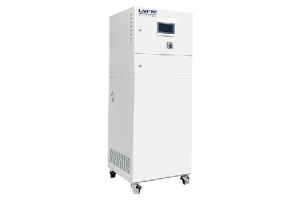Welcher Kühlertyp wird für das Niedertemperaturätzen benötigt?
Das Niedertemperatur-Ätzverfahren erfordert in der Regel eine äußerst präzise Temperaturregelung und eine starke Kühlung, um einen stabilen Betrieb der Ätzgeräte bei extrem niedrigen Temperaturen zu gewährleisten, damit feinere Ätzeffekte erzielt und die Leistung der Halbleiterbauelemente optimiert werden kann.
Zu den für diese Anforderung in Frage kommenden Typen von Kühlern gehören vor allem
Mehrkanal-Kühler: Eine Kältemaschine mit mehreren unabhängigen Temperaturregelkreisen, die die Temperatur verschiedener Teile genau regeln können und eine gleichmäßige und stabile Temperatur im gesamten System gewährleisten. Dies ist besonders wichtig für komplexe Ätzanlagen, bei denen unterschiedliche Temperaturen in verschiedenen Bereichen aufrechterhalten werden müssen.
Niedertemperaturkühler: Dieser Kühlertyp ist für die Erzeugung und Aufrechterhaltung extrem niedriger Temperaturen ausgelegt und bietet eine Kühlleistung von der Umgebungstemperatur bis weit unter den Gefrierpunkt, was für die Anforderungen von Niedrigtemperatur-Ätzverfahren wie -70℃ geeignet ist.
Geschlossener Kühlkreislauf: Das System mit geschlossenem Regelkreis kann die Temperatur effektiver steuern und den Energieverbrauch senken. Es eignet sich für Ätzprozesse, die einen langzeitstabilen Betrieb bei niedrigen Temperaturen erfordern, und reduziert gleichzeitig die Auswirkungen auf die äußere Umgebung.
Halbleiterspezifische Kältemaschinen: Diese Kältemaschinen sind auf die Bedürfnisse der Halbleiterindustrie zugeschnitten und zeichnen sich durch eine hochpräzise Temperaturregelung, schnelles Ansprechverhalten, geringe Vibrationen und niedrige Geräuschentwicklung aus. Einige sind auch mit Wärmetauschern aus speziellen Materialien ausgestattet, um mit korrosiven Umgebungen fertig zu werden.
Handgehaltener Niedertemperaturkühler: Obwohl sie in Produktionslinien nicht so weit verbreitet sind wie große Kältemaschinen, können handgehaltene Niedertemperaturkühler aufgrund ihrer flexiblen und praktischen Vorteile auch für bestimmte lokale Niedertemperaturregelungen oder mobile Anwendungen eingesetzt werden.
Daher muss der eingesetzte Kühler nicht nur die geforderte niedrige Temperatur erreichen, sondern auch kompatibel und in der Lage sein, Kühlmedien unter diesen besonderen Arbeitsbedingungen zu handhaben, während er gleichzeitig eine gute Korrosionsbeständigkeit aufweist. Bei der Auswahl eines Kühlers sollten auch Faktoren wie Energieeffizienz, Wartungsfreundlichkeit, Niveau des intelligenten Steuerungssystems und einfache Integration in bestehende Produktionslinien berücksichtigt werden.
Maßgeschneiderte Lösungen für Kühlanlagen
Verwandte Empfehlungen
-
Kühlung in der japanischen Industrie: Wofür werden Prozesskühler verwendet?
1096Process chillers in Japanese industry provide precise, reliable cooling for electronics, automotive, pharmaceutical, and chemical production.
Details anzeigen -
Welcher Kühlertyp kann für die Kühlung von XRD gewählt werden?
1671Welcher Kühlertyp für die Kühlung von XRD?
Details anzeigen -
Anforderungen an ein Energiespeichersystem für ein temperaturgesteuertes flüssigkeitsgekühltes Gerät
2007Energiespeichersystem: Es muss den Entladebedarf für eine lange Zeit decken. Es eignet sich für die Energiespeicherung auf der Seite der neuen Energieerzeugung, für die Arbitrage von Preisunterschieden zwischen Spitzen und Tälern auf der Nutzerseite usw. Der zukünftige Trend ist, dass...
Details anzeigen -
Operating Principle of LNEYA Industrial Air Chillers
1583Industrial air cooler is a heat exchanger which USES air to cool the hot fluid. The hot fluid in the tube is heated through the exchange of heat between the tube wall, the fin and the outside air, which is usually supplied by the ventilator. Our I...
Details anzeigen
 LNEYA Industriekühler Hersteller Lieferant
LNEYA Industriekühler Hersteller Lieferant














